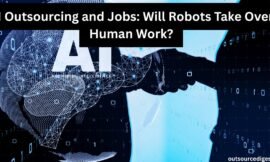The rapid growth of artificial intelligence (AI) outsourcing has sparked a heated debate: will tech skills become obsolete? As businesses increasingly rely on outsourcing partners to handle AI development, data analysis, and automation tasks, professionals in programming, IT, and software engineering are beginning to question the long-term value of their expertise.
This article explores whether AI outsourcing threatens the future of tech jobs—or simply changes the way we define valuable skills in the digital economy.
What Is AI Outsourcing?
AI outsourcing means hiring external providers to build, deploy, or manage AI solutions instead of relying solely on in-house teams. Companies outsource tasks such as:
- Machine learning model development
- Data labeling and cleaning
- Cloud-based AI infrastructure management
- Automation of business workflows
- AI-driven cybersecurity solutions
For businesses, AI outsourcing reduces costs, accelerates innovation, and provides access to specialized expertise. But for employees, it raises questions about job stability.
The Fear: Will Tech Jobs Disappear?
The idea that AI outsourcing could make tech professionals irrelevant is not new. After all, if companies can hire experts overseas or rely on automation to write code, why keep full-time developers?
Common worries include:
- Automation of coding: Tools like GitHub Copilot suggest entire code blocks.
- AI-driven testing: Software testing is increasingly automated.
- Outsourced AI engineers: Businesses prefer hiring pre-trained AI teams instead of upskilling staff.
These trends create the impression that traditional programming jobs may shrink dramatically.
The Reality: Tech Skills Are Changing, Not Vanishing
While certain routine tasks are being automated or outsourced, core tech skills are evolving rather than disappearing.
Skills in decline:
- Basic coding tasks (e.g., CRUD apps, boilerplate code)
- Manual quality assurance testing
- Routine data entry and reporting
Skills in demand:
- AI strategy and integration: Understanding how to apply AI to business problems.
- Data engineering and governance: Building secure, scalable data pipelines.
- Ethical AI and compliance: Ensuring fairness, transparency, and legal compliance.
- AI project management: Coordinating outsourced teams effectively.
Instead of making tech skills obsolete, AI outsourcing shifts the demand toward higher-level problem-solving and strategic thinking.
Why Companies Still Need Tech Talent
Even when businesses outsource AI, they cannot function without internal talent. Here’s why:
- Customization: Outsourced solutions need to be adapted to specific workflows.
- Oversight: In-house professionals ensure quality and ethical compliance.
- Security: Sensitive data requires trusted employees to manage risk.
- Continuity: Outsourcing partners may change, but core teams maintain long-term stability.
In other words, companies need both outsourced expertise and in-house talent to thrive.
The Hybrid Future of Tech Work
Instead of replacing tech workers, AI outsourcing is creating a hybrid model:
- Outsourced providers deliver cutting-edge AI tools.
- In-house teams manage integration, oversight, and long-term strategy.
This means professionals who adapt and learn AI-related skills will remain highly valuable.
How Tech Professionals Can Stay Relevant
If you’re worried about becoming obsolete, here are steps to future-proof your career:
- Upskill in AI: Learn machine learning basics, prompt engineering, and automation tools.
- Focus on human-AI collaboration: Understand how to guide AI tools rather than compete with them.
- Develop soft skills: Leadership, problem-solving, and communication are harder to outsource.
- Stay industry-aware: Follow outsourcing trends in healthcare, finance, and cybersecurity.
Potential Risks of Over-Relying on Outsourcing
Businesses that over-depend on AI outsourcing may face:
- Vendor lock-in: Relying too heavily on one provider.
- Skill gaps: Losing in-house expertise.
- Data security concerns: Sharing sensitive information with third parties.
That’s why many companies are adopting blended models—outsourcing critical tasks but still maintaining strong internal teams.
Conclusion
So, will AI outsourcing make tech skills obsolete?
The short answer is no, but it will transform which skills are most valuable.
Routine coding and manual IT tasks may fade, but professionals who adapt to AI, data governance, and ethical oversight will remain essential. In fact, the future belongs to those who can bridge the gap between outsourced AI solutions and real-world business needs.
Instead of fearing obsolescence, tech workers should embrace AI outsourcing as an opportunity to grow into higher-value roles.





